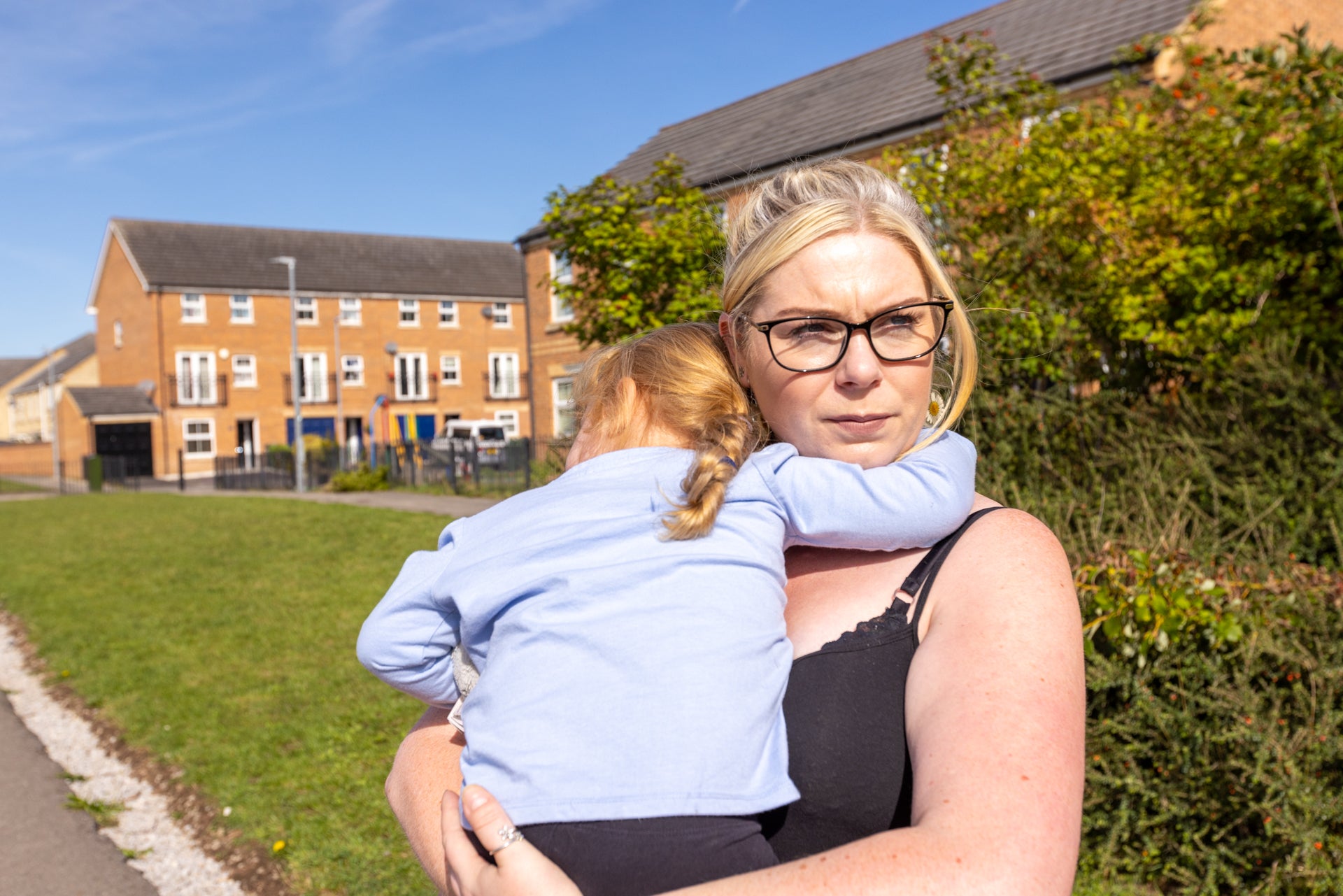Kinship carers step up in times of crisis – it’s time we stood up for them
The lives of people raising the children of family members are made even harder by a lack of support in the workplace – with many forced to quit their careers and go on benefits. Lauren Crosby Medlicott hears from those let down by an ‘unfair’ system


When Natalie had the call asking her to take care of her 10-week-old nephew in August 2022, as his parents were no longer able to look after him, she had just been offered a two-year contract working at a school as a teaching assistant.
“I explained to the school about my nephew and although they were very empathetic, they were unable to offer me any paid leave,” she told The Independent.
Natalie went into panic mode.
“Social services said I had to manage contact with my nephew and his parent four times a week and I very much felt that if I couldn’t do that, he could be taken from me,” the 33-year-old said. “I was in fight or flight mode. Without paid leave and in a state of high anxiety, I was forced to quit my job and go on benefits.”
In the UK, there are more than 180,000 children being looked after full-time by a relative or close family friend because their parents are no longer able to care for them. Known as “kinship carers”, these older siblings, aunts, uncles, or grandparents provide a safe haven for children without having to rely on foster care.
Yet according to a 2022 survey, it was found that eight in 10 kinship carers were not getting the support they needed from their local authorities, and over a third were worried that the lack of support might prevent them from continuing to care for their children in the future.
Financial support and workplace flexibility were reported to have been some of the most common struggles for kinship carers, with seven in 10 forced to spend savings or pension pots, and four in 10 reported skipping meals. Many are using food banks or buying less food each week in order to get by.
“Unlike foster carers, most kinship carers are not entitled to receive a financial allowance or other financial support to help cover the costs of raising a child,” Sam Turner, of the charity Kinship, told The Independent.
“Kinship carers step up typically in crisis situations, opening their doors and their hearts to a child to keep them loved within their family network. But this comes at enormous cost – most kinship carers haven’t expected or budgeted to be financially responsible for a child.”

Having quit her job, Natalie spent all her time going through care proceedings for her nephew in addition to caring for her own two children, who were 13 and 10.
“I had to start going into my savings,” she said. “It was an absolute nightmare of a time.”
“Paid parental leave would have made a massive difference to us all because I could have gone back to work after things had settled down. It would have meant a lot less stress for us all. I would have been happier, instead of panicking about the future and my nephew, and I would have had time to bond and get to know each other without having to worry about money.”
Following new research, in which 68 per cent of carers said their employers do not offer support to kinship carers – such as paid leave or flexible working – the charity Kinship is urging the government to include statutory paid leave in its promised National Kinship Care Strategy, which is due by the end of 2023.
“A lack of support in employment is causing huge numbers of kinship carers to leave work permanently or reduce their hours, resulting in a significant loss of income and financial insecurity for kinship families,” said Turner.
The impact of this lack of support extends even further. A new report has found instances of ill health in both carers and children, a loss of opportunities for the children to heal and settle into their new homes, as well as major challenges for the kinship carers themselves, who are not only dealing with the stress of caring for a child who has experienced significant trauma, but are also juggling employment uncertainty and the growing financial cost.
“Although kinship carers can sometimes take advantage of existing support for employees, such as the ability to request flexible working, there are no specific entitlements for kinship carers as there are for groups like adoptive parents,” said Turner.
“This is deeply unfair – kinship carers are stepping up at a moment’s notice to care for children but aren’t provided with equitable support to help them do so. As kinship carers have no statutory entitlement, employers are under no obligation to offer things like paid leave, and many kinship carers we hear from talk about a lack of understanding in the workplace about how becoming a kinship carer impacts on your work.”
Julia had been enjoying her job as a manager for an NHS medical practice when she had to give it up to take care of her grandchildren.
“They were obviously our priority,” the 68-year-old from West Sussex told The Independent. “Our income plummeted after that, and I was forced to go on benefits.”
The decision came at great personal sacrifice for Julia.
“I’d worked hard for my job,” she said. “I went from being a cleaner, to a manager hiring, training and managing a big budget. Then I went to university as a mature student and got a diploma. So, it was a massive hit in every respect to give it up.”

If she’d had paid leave, Julia said she could have had time off with the children when they first arrived, but then could have gone back to work.
“It would have been better for all of us,” she said. “Our lives would have been much better as we would have had a bigger income.”
Like Julia and Natalie, 41 per cent of kinship carers recently surveyed said they had to leave work permanently to care for their child. Another 45 per cent said they had to reduce their hours.
“As a result, more than a third experienced a drop of more than 50 per cent to their household income,” said Turner. “Twenty-eight per cent were forced into claiming benefits. A lack of support in the workplace is unnecessarily pushing kinship carers out of employment, resulting in a significant drop to their earnings – and few can expect the local authority to step in and provide the financial support they need given the fall in income.”
Foster carers have a lengthy period of training and preparation to help them get ready for a child and can expect continuing financial and other forms of support – this isn’t the case for kinship carers. While there is some financial support from local authorities, it is very unclear as to what that support is or how to access it.
“Our biggest concern is that a lack of proper financial support for kinship families will ultimately lead to kinship carers being unable to continue caring for the children,” said Turner. “This would come with devastating consequences for children and families, as well as for the state, as it costs significantly more to the public purse for children to be raised in foster or residential care.”
Kinship wants to see the UK government introduce a new entitlement for kinship care, on a par with adoption leave and pay.
“This would mean that kinship carers can get the time off they need to help care for a child in need of a loving home, but aren’t forced to leave their jobs and plunged into poverty in order to do so,” said Turner. “We are currently forcing too many kinship carers out of work and failing to provide the support they need.”
What is required is kinship-friendly employers. Employers who understand kinship care and will provide paid leave for them to care for their child.
Katie, a 34-year-old working in human resources, had a positive experience when she told her manager she’d have to take care of her very young niece, whose mother could no longer look after her.
“I had been in my new role for less than one month,” she told The Independent. “Being so new at work, I worried that I was already being a burden. I told my manager I didn’t know what the next weeks or months would look like.”
As it turned out, Katie had nothing to fear. Her manager told her she could flex her hours to look after her niece.
“I was given immediate trust and told that as long as the work got done, everything was fine,” she said. “That made a massive difference to me. Flexible working meant I could be there for my eight-month-old niece and be present in those early months, helping her to settle in with me and my partner Mark in her new home.”
The family of three had the finances and flexibility to find a new routine.
“If my boss hadn’t been supportive, I would have been at risk of either losing my niece, or having to give up my job, my career and my identity,” she said.
While she is eternally thankful to her employer, she thinks the situation would have been even better had she been entitled to statutory paid leave.
“We were already on a reduced income as Mark was furloughed, so there was a lot of financial stress on me,” Katie said. “From a physical and wellbeing perspective, I was really tired through the lack of sleep, and I suffered with my mental health due to the stress. If I’d had statutory paid leave, it would have given me the time to completely focus on my niece, without worrying about our finances so much. It would have made a big difference.”
While Natalie, Julia and Katie continue to care for the children of their family members, they are hopeful for change so that other kinship carers don’t have to suffer the financial insecurity and stresses they went through.
“It’s massively unfair that kinship carers are not entitled to the same statutory entitlements, such as paid leave and flexible working, as adopters and birth parents,” Natalie concluded.
“There’s no difference between us. I’m raising a family member’s child who would otherwise have gone into the care system.”
Join our commenting forum
Join thought-provoking conversations, follow other Independent readers and see their replies
Comments
Bookmark popover
Removed from bookmarks